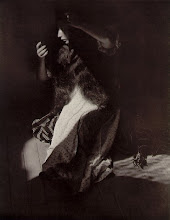Bergman - The Silence (1963)
The Silence opens with a young boy asking his mother about a sign written in a foreign language. ‘What does this mean?’ To which his mother replies that she doesn’t know. And in those opening seven minutes, as the boy, his mother and his aunt travel on a train to an unknown country, Bergman expertly sets up that strange experience of being in a distant world, where everything around you is unknown and inexplicable.
The boy, Johan, is then placed outside when his aunt Ester starts to cough and choke and the door is closed on him. His curiosity takes him along the corridor for a series of brief glimpses into the other carriages, before he looks out of the window at the passing scenery and in a kind of dreamlike hallucination sees a series of tanks driving across the landscape.
The film takes place in a foreign called Timoka. There is a tremendous heat throughout the day, which lingers long into the night. The country appears to be either occupied or at war as suggested by the presence of the tanks, which add further weight to Bergman’s battlefield. The elder sister, Ester is ill and takes to her bed, whereas the younger sister, Anna tries to cool down by taking a bath. This arouses the interest of her son and she asks him to wash her back.
Bergman’s severity charges the film with such overt eroticism that almost everything becomes a reference to some latent sexuality, such as the boy puffing up his cheeks to make a faint screeching noise and then lying down in the soft cushions and raising his hand up into the air like a snake.
Then in a series of highly structured encounters, Bergman explores the degree of control each character has over another. These range from the comical meeting between the boy and the dwarves in one of the hotel rooms, to the formal encounter between Ester and the porter, to the sexual encounter between Anna and the couple having sex in the theatre.
Ester’s intellectual ambition is one form of control, but she is scared by her sister’s sensuality – the way Anna sleeps naked and picks up guys at a restaurant, but on the other hand, the only way Anna can exert some form of control is through these sexual encounters. She is also very much aware of the power she has over her sister and there is an almost incestuous attraction as Ester watches Anna undress to take another bath after dirtying her dress outside.
The boy acts as a sort of pivot between the two conflicting women. His innocent amusement guides him through the hotel, from rebellion (pissing in the corridor) to mischief (hiding the porter’s photographs) to curiosity (as he watches his mother go into a room with the waiter, nonchalantly telling Ester about it later without any indication of emotion). He is not fazed by his encounter with a traveling troupe of dwarves as they dress him, he doesn’t mock them or question them, but simply accepts them. In one of the few humorous moments in the film, the dwarves return from their show and pass Anna who is crying in the corridor. She stares at them in confusion and in a rather absurd, Bunuel-esque manner, each of them bows his head courteously to acknowledge her.
Human tenderness will always be coupled with human bitterness and although Johan’s actions appear naïve at first, on closer inspection, it becomes apparent that even he has the capability to oscillate from one extreme to the other, liberty to repression, love to hate etc. etc. For the two women, neither of them are wholly satisfied with the life they are leading, each wanting perhaps a part of the others, but only becoming frustrated when they cannot have it and resorting to complex mind games in an attempt to dominate the other and exert some form of control.
All three display a desire to understand and their attempts (with the exception of Johan) inevitably lead to dispute. The two sisters have an especially strong desire to understand one another, except there are so many things which get in the way to prevent them. Perhaps that’s the point that Bergman’s trying to make - that these desires ultimately lead only to destruction… In the evening of the first day, Ester is listening to Johann Sebastian Bach to the radio while Anna dries herself in the open-doored bathroom. A few moments later the porter brings in tea. He recognises the music’s composer which he mentions in passing and shuffles out of the room. This brief display of knowledge, prompts Anna, who we presume didn’t know who the composer was, to spitefully relate an earlier encounter with a waiter to Ester, because she knows that is something, unlike Bach, her sister will not be able to understand.
Bergman’s exploration of the unconscious was extremely shocking at the time and people reacted so strongly that the director even received death threats and worst of all a feces-smeared piece of toilet paper. But within the starkness of Bergman’s images (photographed by the excellent Sven Nykvist) there is at its heart one of the most beautiful pieces of cinema of all time. The whole thing unravels like a dream and it is certainly one of the best, if not the best of Bergman’s so-called Chamber pieces.



0 comments:
Post a Comment